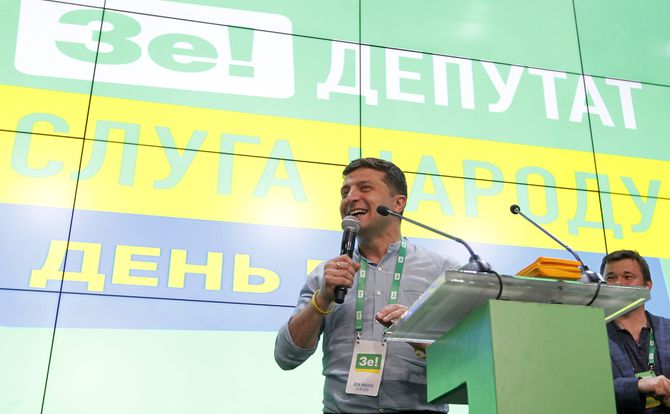An opportunity to solve the Russia-West and Ukraine conundrum
Ukrainian President Volodymyr Zelenskiy’s party took the largest share of votes in the country’s parliamentary elections, paving the way for him to initiate a new dialogue with Russia. It presents an opportunity to ratchet down tensions with Moscow. The alternative – battered economies and sanctions – is in none of the parties’ interests.

In Ukraine’s July 21 parliamentary elections, the party of President Volodymyr Zelenskiy won nearly 43 percent of the vote, a huge success. A coalition with one of the smaller parties will allow President Zelenskiy to begin implementing his agenda.
His program calls for administrative reform and fighting corruption. His predecessor, former President Petro Poroshenko, made promises to do the same, but was unable to make enough progress.
Mr. Zelenskiy’s program also takes a new approach toward Russia. Doing so could open up a large geopolitical opportunity. President Zelenskiy, clearly pro-Western in his leanings, wants to meet with the Russian leadership with French and German backing.
Irreversible annexation
Following Russia’s annexation of Crimea and the downing of Malaysian Airways Flight 17, the West imposed economic sanctions on Russia. The annexation of Crimea appears irreversible (this is not the case with Ukraine’s breakaway regions of Donetsk and Luhansk, which could find their way back into the country if a mutually satisfactory agreement with Russia is found). Russia’s takeover of Crimea could lead to the sanctions, a form of hybrid war between Russia and the West, becoming permanent. The situation has very harmful consequences for Russia and the West, but especially for Ukraine.
The situation has very harmful consequences for Russia and the West, but especially for Ukraine.
In a recent GIS report, Dr. Svyatoslav Kaspe confirms that the annexation of Crimea is, unfortunately, irreversible. According to him, an independent Crimea would have brought Russia the same security regarding its naval base in Sevastopol and the peninsula’s strategic position. As opposed to Donbas, a majority of the population in Crimea wanted to secede from Ukraine, fearing “Ukrainization.” People there favored independence or joining the Russian Federation. Independence, based on the principle of self-determination, would have been less of an offense to international law than Russia’s annexation.
Dr. Kaspe continues to argue a potential solution could be to put the issue of Crimea aside in the negotiations, as the United Kingdom and Spain have done concerning Gibraltar. Then, with a Russian “retreat” from Donbas, and a Ukrainian amnesty for the insurgents, conditions for normalizing Ukrainian-Russian relations – so important for both economies – could be reached.
For Ukraine, the war, with all its human and financial costs, would be over. Painful as a de facto loss of Crimea would be, Kiev could concentrate on administrative reform and economic development. The European Union could support the recovery by opening borders to Ukraine and eliminating trade restrictions. Such moves would consequently enhance Kiev’s trade relations with Russia.
Russia-West reconciliation
But there is a second, wider geopolitical opportunity. The West’s sanctions on Russia could be discontinued and political relations normalized. Political relations with Russia are essential for Western and Central Europe, but they are also important for the United States. The U.S. and China are entering a conflict – of which their trade dispute is only a small part – of historic dimensions. The West’s sanctions against Russia are driving the country toward partnership with China, a state of affairs that is certainly not in the interests of either the U.S. or Europe.
East Asia’s economy has become huge, and perhaps the most important in the world. China, with its Belt and Road Initiative is securing for itself – economically and politically – the land link between Europe and its markets. If the West does not foster a better relationship with Russia, Beijing will be left in full control of the trade routes through Central Asia, and Europe would become logistically dependent on China. It would certainly be beneficial to avoid these situations.
Moscow worries about Western interference in Russia’s internal matters.
However, there is a lot of suspicion between Russia and the West. The West fears Russian aggression in the region between the Baltic Sea and the Black Sea; Moscow worries about strong Western military and political influence on its periphery, and with it interference in Russia’s internal matters.
The negotiations President Zelenskiy envisages with Russian President Vladimir Putin, which would include some kind of French and German presence, could open up an opportunity. The problem cannot be resolved between Ukraine and Russia in isolation. The mutual distrust, not only between Ukraine and Russia but also between Russia and the West, will have to be addressed and, hopefully, alleviated.
The Kremlin is well aware that it must not only worry about its western border – there are also its vast territories in the east, bordering China. The moment has come where it is in the interest of all the major parties to find a path to peace for Ukraine and end the mutually damaging – and unsuccessful – system of sanctions.
